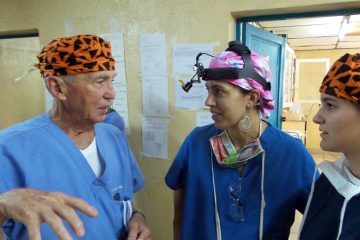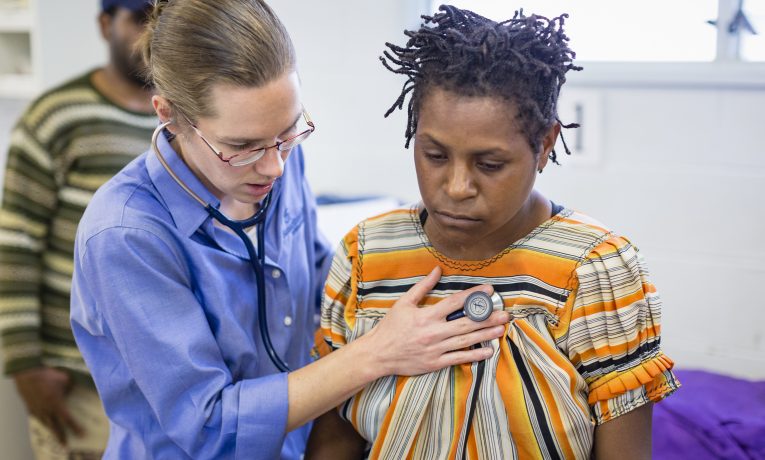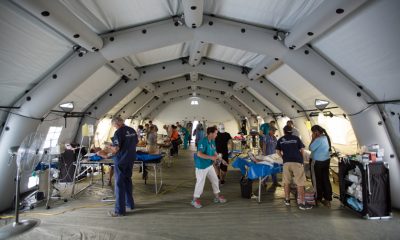2004-Present: Samaritan’s Purse offers young doctors and dentists a unique opportunity to follow in the footsteps of the Great Physician through our Post-Residency Program.
Missionary doctors are the lifeblood of overseas Christian hospitals, helping to fill critical staffing needs for medical facilities that typically operate with limited resources in remote corners of the world. These facilities may be the only regional health care available—and the only Gospel witness for Jesus Christ—for tens of thousands of people.

Dr. Richard Furman and his granddaughter visit with former post-resident Dr. Rachel McLaughlin (center). She now serves long-term at Kibuye Hope Hospital in Burundi.
When career missionaries retire, their sending agencies encounter difficulties recruiting the next generation of doctors to take their place. Sadly, in some instances hospitals have dwindled down from four or five missionary doctors to one and finally none, resulting in closure.
World Medical Mission co-founder Dr. Richard Furman heard story after story of struggling hospitals and wanted to do something to help. The primary focus of the ministry involves sending out doctors on short-term trips to fill temporary staff needs. But how could World Medical Mission encourage young doctors, fresh out of their residency programs, to commit to serving long term on the mission field?
“Even though some of these doctors felt called to the mission field, they would postpone their calling for a few years in order to work a while and begin paying off their debts,” said Furman, a retired thoracic vascular surgeon who has donated his time and skills at dozens of mission hospitals over the past 40 years.
“The hitch was they would get a job and buy a car and perhaps a house, and then they would realize how long it was going to take to get their debt paid and never make it to the field.”
SEE MORE 50TH ANNIVERSARY CONTENT FROM SAMARITAN’S PURSE
In 2004, World Medical Mission’s Post-Residency Program was established to guide and support young doctors and dentists who were interested in missionary medicine. During their two-year assignments at an overseas hospital, they work alongside other Christian physicians and gain practical experience to prepare them for a lifetime of ministry.
“We are looking for evangelists who happen to be physicians” is the program motto. While treating the sick and saving lives is certainly important, the most critical role of a missionary doctor is to point patients to the Great Physician, Jesus Christ. Only through Christ can they experience spiritual healing and salvation.
The impact on the 32 mission hospitals in 24 countries where we have placed Post-Residents has been significant, as nearly 80 percent who complete the program decide to stay on the field.
“We are looking for evangelists who happen to be physicians.”
Since its inception, more than 200 men and women have participated in the program. Currently 29 Post-Residents are serving on their two-year assignments, including a pediatrician from Australia and a dentist from Guatemala. Another 17 doctors will come to Samaritan’s Purse for orientation in August and will be placed in 10 hospitals in nine countries.
Dr. Erin Meier arrived at Kudjip Nazarene Hospital in Papua New Guinea in 2007 and decided to remain after completing the Post-Residency Program. The family medicine specialist now serves as the hospital’s medical director.
“Very quickly I fell in love with the place and the people,” Meier said. “I stayed because I knew God had called me to Papua New Guinea, and I never felt called to leave.”
The COVID-19 pandemic has severely impacted mission hospitals staffing and operating budgets. When international travel resumes, more medical missionaries than ever will be needed to serve on short-term trips with World Medical Mission or through the Post-Residency Program.
“He [Jesus] said to them, ‘Those who are well have no need of a physician, but those who are sick. I did not come to call the righteous, but sinners, to repentance’” (Mark 2:17).









